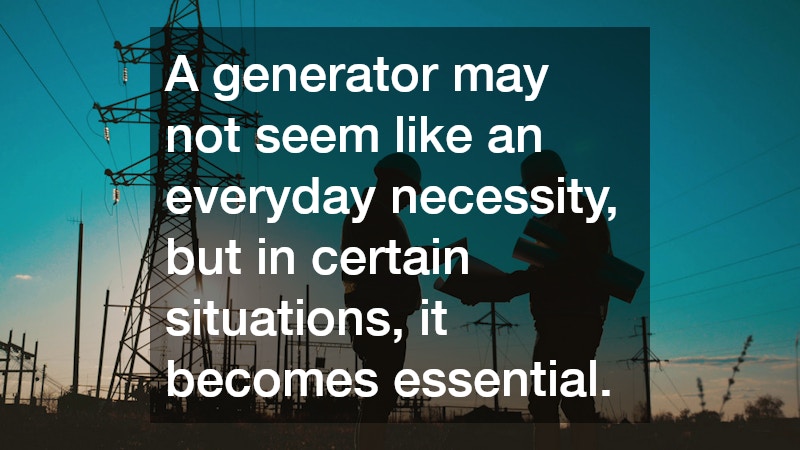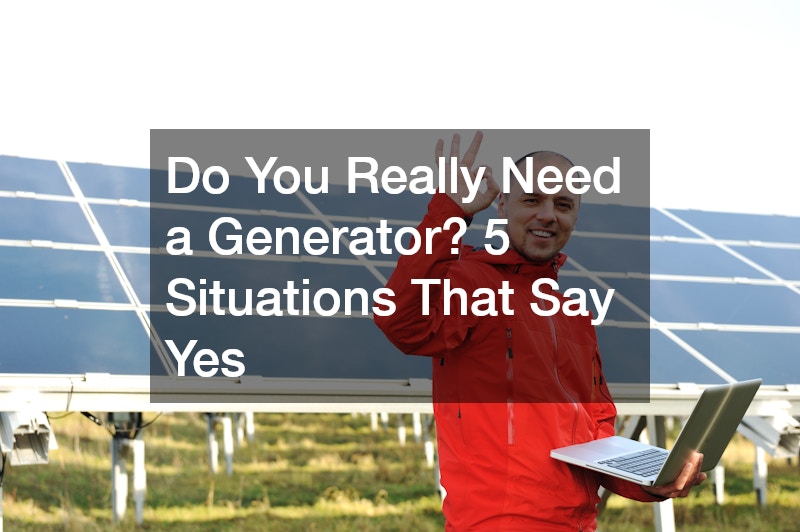Generators are one of those items you may not think about until you desperately need them. Power outages can happen unexpectedly, and when they do, they can disrupt your daily life, damage appliances or even put your safety at risk. For some households and businesses, having a generator is more than just a convenience — it’s a necessary backup plan that keeps essential systems running when the power goes out.
If you’re unsure whether investing in a generator is worth it, there are a few clear situations where having one makes all the difference. From extreme weather to medical needs, here are five times when a generator proves its value.
During Storms and Natural Disasters
Severe weather is one of the most common reasons people experience power outages in Australia. High winds, heavy rain, lightning strikes and floods can knock down power lines and leave homes and businesses without electricity for hours or even days.
In storm-prone regions, a generator provides a reliable source of power to keep your lights on, food cold and communication lines open. Whether it’s running your fridge, sump pump or emergency lighting, a generator ensures you can ride out the storm with less disruption and stress. For homes with children or elderly residents, it also provides vital comfort and safety when temperatures drop or rise suddenly.
If You Live in a Rural or Isolated Area
For those living in remote or semi-rural areas, the power supply may not be as reliable as in urban locations. Power outages can take longer to fix, especially if utility crews must travel long distances or deal with hard-to-access areas.
In these cases, a generator is an essential tool for maintaining basic household operations. It can power your water pump, heating and cooling systems, and even internet access. If you rely on a bore or tank for water, a generator ensures you won’t lose access during an outage. For those who work from home or manage farm equipment, it helps avoid lost productivity and wasted resources.
When You Rely on Medical Equipment
For households where someone depends on powered medical devices — such as oxygen machines, CPAP machines or refrigeration for medication — having a generator is a non-negotiable safety measure. Power loss in these situations can be more than inconvenient; it can pose serious health risks.
A backup generator gives peace of mind that critical equipment will keep running no matter what. Even a small portable unit can supply the necessary power to maintain health and safety during unexpected blackouts. For those managing ongoing health conditions, the ability to power devices consistently is vital.
To Protect Food and Appliances
Extended power outages can lead to the spoilage of refrigerated and frozen food, which becomes costly over time. A generator keeps your refrigerator and freezer running so you avoid throwing away hundreds of dollars in groceries.
Beyond food, modern homes often have multiple sensitive electronic devices and appliances that can be damaged by sudden outages or voltage drops. A generator not only supplies backup power but also helps regulate electrical flow, protecting devices like televisions, computers, modems and heating systems from damage.
If You Run a Home Business or Work Remotely
More Australians than ever are working from home or running small businesses from their residential properties. A power outage that lasts even a few hours can mean lost income, missed deadlines and damaged client relationships.
With a generator, you can continue using your internet, charging devices and operating essential equipment. Whether you’re editing videos, handling customer orders or managing live calls, a generator helps maintain continuity and productivity. This is especially important if your business handles sensitive data or provides urgent services that require constant online access.
Choosing the Right Generator
Once you’ve decided that a generator suits your needs, choosing the right type is the next step. Portable generators are suitable for occasional use and can power select appliances during an outage. Standby generators are a more permanent solution that connects directly to your home’s electrical system and automatically activate when power is lost.
Consider the size of the generator based on the number of appliances or systems you want to support. Always consult with a licensed electrician to ensure your generator is installed safely and complies with Australian standards. Fuel options — including petrol, diesel and solar — should also be evaluated based on availability and convenience.
Maintenance and Safety Considerations
Owning a generator means keeping it in good condition. Routine maintenance, such as checking oil levels, testing the battery and running the system regularly, ensures your generator is ready when needed. It’s also important to store fuel safely and by local regulations.
Never run a generator indoors or in poorly ventilated spaces due to the risk of carbon monoxide poisoning. Always follow the manufacturer’s instructions and place the unit on a stable surface away from windows and doors.
A generator may not seem like an everyday necessity, but in certain situations, it becomes essential. From protecting health and safety to keeping food fresh and work uninterrupted, having backup power can be a lifesaver — literally and financially.
If you live in a storm-prone region, work remotely, care for someone with medical needs or simply want to avoid the inconvenience of losing power, a generator is a practical investment. The peace of mind it brings, especially during unpredictable weather or emergencies, is worth far more than the upfront cost.



